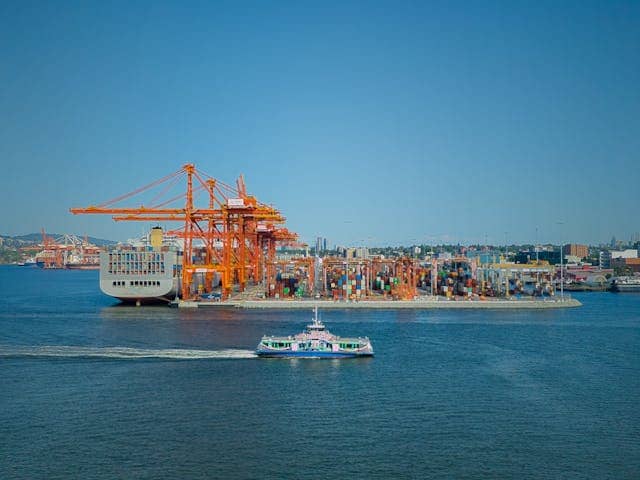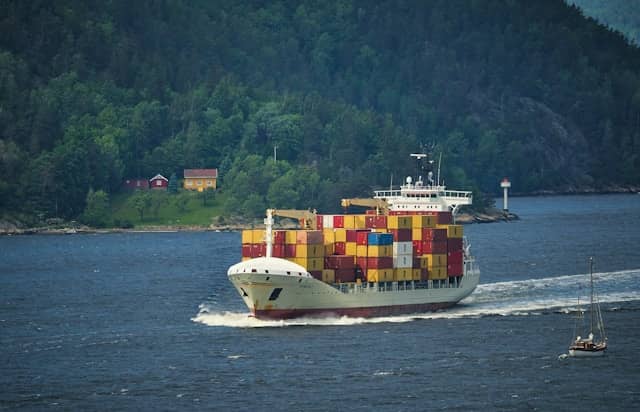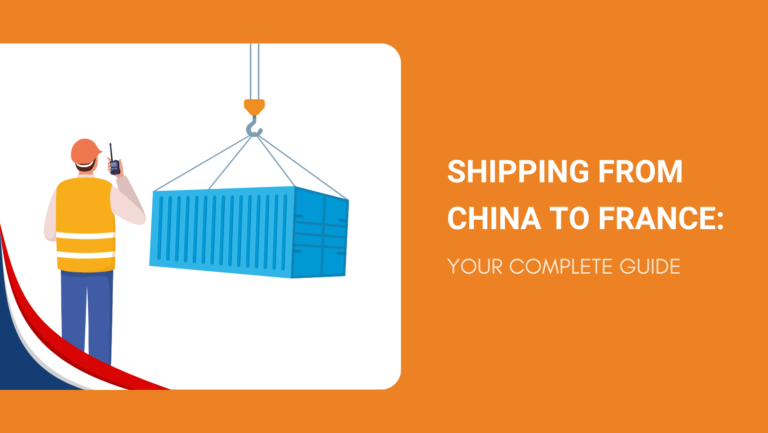As the e-commerce landscape expands globally, the ability to move goods efficiently from China to France has become increasingly vital.
You’re navigating a trade route that’s essential not only for large businesses but also for individual entrepreneurs looking to tap into the vast offerings of the Chinese market.
Understanding the shipping process is fundamental to keeping your business competitive. You’ll need to consider the key ports and airports, transit times, costs and budgeting strategies, and the regulatory requirements for customs compliance in France.
That’s why this article aims to guide you through the intricacies of shipping from China to France, whether by sea, air, or rail, to ensure your goods arrive safely and in a cost-effective manner.

Modes of Shipping: Sea, Air, and Rail
When shipping from China to France, you’ll have to choose between sea, air, and rail freight depending on your budget, time frame, and cargo size. Each mode offers distinct advantages and considerations.
Sea Freight
When you consider sea freight for your shipment from China to France, you have two main options: Full Container Load (FCL) or Less Than Container Load (LCL).
FCL means your goods fill an entire container, while LCL is used for cargo that won’t fill a whole container and is thus shared with other shipments.
Sea transportation is generally the most cost-effective option, especially for large and heavy shipments.
However, it’s also the slowest, with transit times ranging from 30 to 40 days. Ocean freight’s reliability makes it a staple in international trade, with major ports like Shanghai connecting to European hubs like Le Havre.
Pros
- Cost-effective for large volumes
- Good for heavy or bulky cargo
Cons
- Slower than air or rail
- Can be affected by weather and port congestion
Top-Rated China Freight Forwarder
Expert Shipping Solutions for Your Needs
Air Freight
If speed is crucial for your shipment from China to France, air freight is your best bet.
Goods often depart from major airports like Shanghai Pudong International Airport and arrive in France through Paris Charles de Gaulle or Paris Orly Airports in just 5 to 7 days.
This is ideal for high-value or time-sensitive items. While it offers the fastest door-to-door delivery, it’s also the most expensive, and the cargo weight and size are subject to more restrictions compared to ocean shipping.
Pros
- Fastest method for urgent shipments
- High level of security for cargo
Cons
- Higher costs
- Limited by cargo size and weight restrictions

Rail Freight
Rail freight offers a balance between the speed of air freight and the cost-effectiveness of sea freight. It is a viable option due to the historic Silk Road rails connecting China with European countries, including France.
The journey takes roughly 18 to 20 days, which is faster than sea freight while often being less expensive than airfreight.
Rail freight is also considered to have a lower environmental impact compared to other modes of transportation.
Pros
- Faster than sea freight but less costly than air freight
- More environmentally friendly
Cons
- Limited delivery flexibility compared to air freight
- Not as fast as air shipping for urgent needs
Key Ports and Airports in China and France
When you’re shipping from China to France, it’s important to know the major hubs that handle air and sea freight. Here’s a breakdown of key locations that will likely play a role in your shipments.
Airports in China
- Shanghai Airport: As a bustling metropolis, Shanghai Pudong International Airport serves as a primary air freight hub.
- Beijing Airport: Beijing Capital International Airport is another vital airport for moving goods in and out of China.
- Guangzhou Airport: When shipping to and from southern China, Guangzhou Baiyun International Airport plays a key role.
- Shenzhen Airport: For cargo originating near Hong Kong, Shenzhen Bao’an International Airport is an optimal choice.
Airports in France
- Charles de Gaulle Airport in Paris: This is France’s largest airport and a central hub for international air freight.
- Lyon-Saint Exupéry Airport: An essential air freight terminal for the Lyon region.
- Marseille Provence Airport: Serves the south of France and is crucial for trade with Mediterranean regions.

Sea Ports in China
- Port of Shanghai: The world’s busiest container port is primed for high-volume shipping.
- Port of Ningbo-Zhoushan: Close to Shanghai, this port is efficient for shipping to France as well.
- Port of Shenzhen: Encompassing several ports like Yantian, Shenzhen is key for exports.
Sea Ports in France
- Port of Le Havre: As the largest French port, it’s a primary gateway for cargo entering and leaving France.
- Port of Marseille: Located on the southern coast, this port handles a significant share of sea freight.
Cost Analysis and Budgeting When Shipping from China to France
When planning to ship items from China to France, understanding the associated costs is essential for budgeting. The following breakdown will help you navigate these expenses effectively.
Factors Influencing Shipping Costs
- Route and Distance: The cost to ship your cargo varies significantly with the selected route and the total distance. Longer routes typically incur higher costs.
- Weight and Volume: The weight and volume of your cargo determine the shipping method and price. Heavier or larger packages can result in higher freight rates. Volumetric weight is also factored in for air freight.
- Type of Service: The level of service—whether it’s express air freight or standard ocean shipping—influences your cost. Speedier services come at a premium.
- Container Sizes: The container size needed for your shipment affects costs, with larger containers being more expensive.
- Additional Costs: Insurance, packing, handling, fuel charges, and the type of service all add to the overall cost.
- Competitive Rates: Shopping around for competitive shipping costs is worthwhile, as rates can vary between providers.
- Payment Method: Some carriers offer different rates depending on the payment method, so it’s worth checking this detail.
Pricing Estimates
| Shipping Method | Estimated Cost |
| Air Freight | $3.9 – $4.8 per kg |
| Sea Freight (LCL) | $30-$120 per CBM |
| Sea Freight (FCL) | $3500 – $6400 per CBM |
| Rail Freight | $240 – $250 per CBM |
Please note these are approximate pricing estimates which will vary based on the specifics of your shipment, such as weight and size.

Transit Times from China to France
When planning to ship items from China to France, you should be aware that the transit time—how long your shipment takes to arrive—can vary based on several factors.
This knowledge can help you plan better and set the right expectations for your shipment’s arrival.
Factors Influencing Transit Schedules
Several variables can affect the timeframe it takes for goods to travel from China to France.
Origin and destination play crucial roles as connecting routes can differ significantly.
For instance, shipping from a major port like Shanghai to Marseille can be faster than from a less accessible Chinese city to a remote area in France.
The chosen method of transport—be it air freight, sea freight, or rail freight—presents different average transit times.
- Air freight is usually the fastest option, with goods typically reaching their destination in 5 to 7 days.
- Sea freight comes with a longer wait, taking about 30 to 40 days.
- Rail freight offers an intermediate solution, with transit times around 18 to 20 days.
In addition to the mode of transport, delays can sometimes occur due to factors such as customs clearance processes, weather conditions, or congestion at ports.
Moreover, public holidays in either China or France can also lead to changes in transit schedules, potentially extending the transit time. It’s essential to factor in these potential delays when planning your shipments.
Door-to-door services include additional steps, such as collecting goods from the origin and delivering them to the final destination, which can add to the total transit time.
Always confirm specific timelines with your shipping provider, as they will give you a more accurate estimate based on current conditions.
For a quick reference to the average times for each shipping method, consult the table below:
| Transport Method | Average Transit Time | Potential Delays |
| Air Freight | 5-7 days | Weather, holidays |
| Sea Freight | 30-40 days | Port congestion, customs |
| Rail Freight | 18-20 days | Logistics, holidays |
Remember that while these are average transit times, your shipment could arrive sooner or experience unforeseen delays.
It’s always a good idea to plan accordingly and stay informed by checking with your shipping provider about the most up-to-date shipping schedules.
Customs Compliance in France

When shipping your goods from China to France, navigating through French customs regulations is crucial. You’ll need to be informed about the responsibilities and documentation required for smooth customs clearance.
List of Requirements
To ensure your shipments comply with French regulations, a comprehensive understanding of the necessary documents and procedures is essential. Below is a breakdown of the primary requirements:
- Commercial Invoice: This key document details your transaction and should include information on the value, quantity, and nature of the goods.
- Packing List: This accompanies the commercial invoice, providing specifics on the packaging details of your shipment.
- Certificate of Origin: This document verifies the products’ manufacturing and processing origins.
EU regulations necessitate certain standards for import clearance, and as France is a member of the European Union, you’ll be engaging with the EU’s common customs tariff for imports.
If you’re an importer to France, staying informed about the value and volume restrictions is essential. Remember, items valued over EUR 1,000, or weighing over 1,000 kg, require a formal declaration to customs.
Lastly,pay attention to the import taxes and duties that may apply. These are calculated based on the CIF value (Cost, Insurance, and Freight) of the goods imported.
Choosing the Right Freight Forwarder
When you’re shipping from China to France, selecting the right freight forwarder is crucial for your business. A freight forwarder is not just a service provider but a partner in your logistics network. Think of them as the bridge connecting your goods to the market.

1. Identify Your Needs.
Begin by categorizing your shipments. Will you need air, sea, or rail freight? Each mode has different timeframes and costs, with air freight being the fastest and sea freight often being the most economical for larger shipments.
2. Research Potential Forwarders.
Look for freight forwarders with a strong network of partnerships. Companies like DHL, UPS, and FedEx have extensive global networks and offer a variety of shipping options.
3. Check Services Offered.
Ensure the forwarder provides comprehensive services such as customs clearance and shipment tracking. Real-time tracking is a valuable service that keeps you informed on your shipment’s status.
4. Verify Credentials.
The forwarder should be credible with necessary certifications and a good reputation in international shipping. Check their client testimonials and reviews for feedback on their reliability and service quality.
5. Ask About Customer Support.
Confirm they offer responsive customer support. If there’s an issue with your shipment, you want to guarantee they’ll address it promptly.
Top-Rated China Freight Forwarder
Expert Shipping Solutions for Your Needs
FAQs about Shipping from China to France
Navigating the logistics of international shipping can be complex. Here, you’ll find answers to common questions about shipping goods from China to France, including duties, regulations, prohibited items, packaging, and cost-saving tips.
What Are the Import Duties and Taxes When Importing Goods from China to France?
When you import goods from China, French customs imposes a 22% value-added tax, which includes 0-17% customs duties and 4.2% general tariff. The exact cost may vary depending on the nature of the goods.
Are There Any Specific Regulations I Should Be Aware of When Shipping Certain Types of Goods to France?
Yes, there may be specific regulations depending on the type of goods.
France has strict policies on items like food products, chemicals, and electronics. It’s crucial to check with both Chinese exporters and French customs to ensure compliance.
What Cannot Be Shipped to France?
Certain items are prohibited from shipping to France. These typically include hazardous materials, illegal substances, weapons, and counterfeit goods. To confirm that your items are allowed, consult French customs regulations.
What Are the Packaging Requirements for Shipping Goods from China to France?
Packaging must protect your goods during transit and should comply with international standards. Items must be properly packed, sealed, and labeled. For detailed guidelines, you should refer to the requirements provided by your chosen shipping carrier.
How Can I Reduce the Cost of Shipping from China to France?
To minimize shipping costs, consider options like consolidating shipments, choosing the most economical route and transport mode, and accurately forecasting warehouse needs to avoid overstocking.
Working with a trusted freight forwarder can also provide cost-effective solutions and route optimization.
Setting Sail for Successful Shipping from China to France
Shipping goods overseas presents various challenges, but with the right approach, you can ensure your cargo arrives in France efficiently.
When choosing a freight forwarder, consider their expertise in handling shipments from China to France. They should be able to guide you through customs, tariffs, and any required documentation. Our freight forwarding services offer comprehensive support throughout the shipping process.
Effective tracking of your shipment is vital for peace of mind during transport. Ensure you select a freight forwarder that offers transparent tracking systems, so you know where your products are at all times.
Remember that seasonal fluctuations can impact shipping times, especially during Chinese holidays or peak European vacation months. Plan accordingly to avoid unexpected delays.
Finally, if you’re looking for quality products and a seamless shipping experience from China to France, consider submitting a sourcing quote request. Additionally, to ensure your shipments are handled efficiently from start to finish, request a freight forwarding quote.
We can help you better navigate the complexities of international logistics and find the right supplier for your needs.

